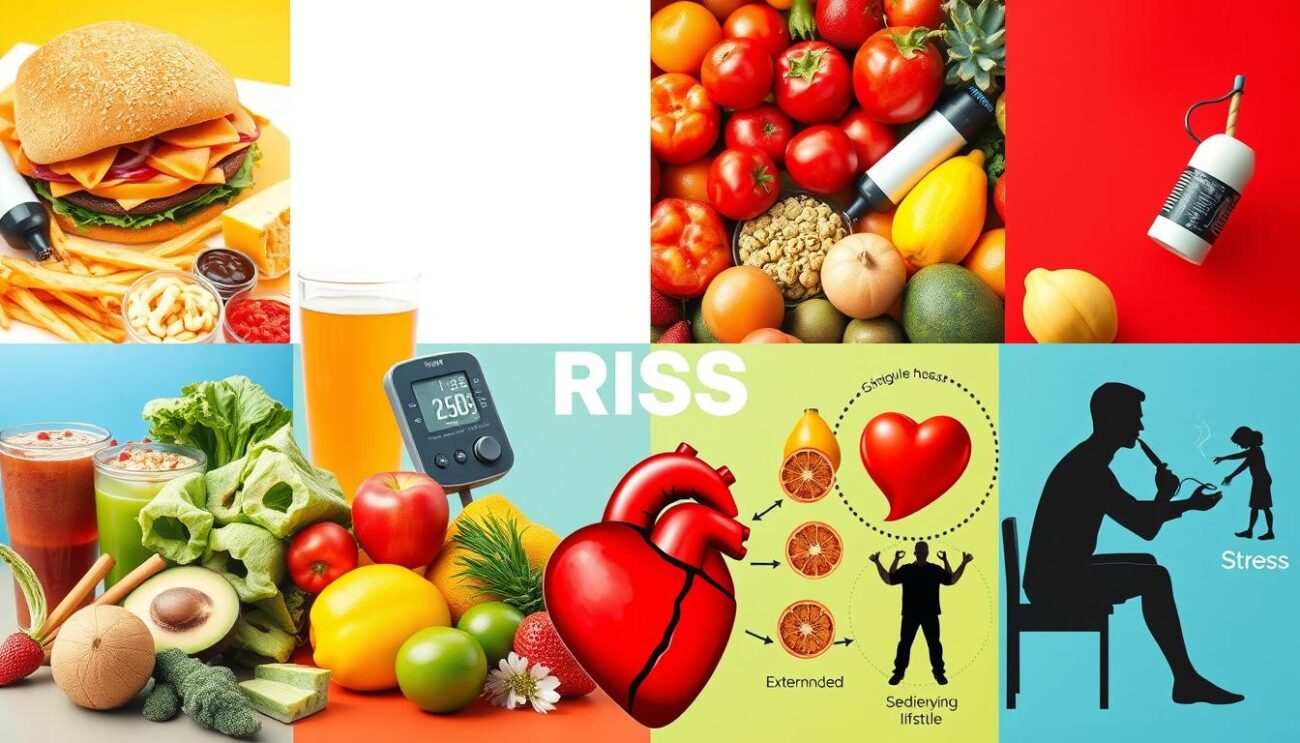Did you know heart disease kills more U.S. women than Alzheimer’s, all cancers, and accidents? It’s a shocking fact that shows how vital heart health is. In this guide, we’ll share key tips to boost your heart health and lower heart disease risk.
Key Takeaways
- Heart disease is a leading cause of death for women in the U.S.
- Managing cholesterol and blood pressure levels are crucial for heart health
- Adopting a heart-healthy diet and regular exercise routine can significantly improve cardiovascular wellness
- Quitting smoking and reducing alcohol intake are important lifestyle changes to reduce heart disease risk
- Regular checkups and screenings are essential for monitoring and maintaining good heart health
Understanding Cardiovascular Health
Cardiovascular disease (CVD) covers many heart and blood vessel issues. It includes heart attacks and strokes. Knowing the risk factors is key to keeping your heart healthy.
What is Cardiovascular Disease?
Cardiovascular disease affects the heart and blood vessels. The main types are:
- Coronary artery disease: Arteries get clogged with plaque.
- Heart attack: Blood flow to the heart is blocked.
- Stroke: Blood flow to the brain is blocked.
- Heart failure: The heart can’t pump blood well.
Risk Factors for Heart Disease
Many things can raise your risk of heart disease. These include:
- High cholesterol levels
- High blood pressure
- Diabetes
- Obesity
- Physical inactivity
- Smoking
- Drinking too much alcohol
Changing your lifestyle can lower your risk. Quit smoking, stay fit, and eat right. These steps can help a lot.
Managing these risk factors is vital. It helps avoid serious heart problems like heart attacks and strokes.
Maintain Healthy Cholesterol Levels
Keeping your cholesterol levels healthy is key for your heart. High LDL (bad) cholesterol can lead to artery blockages. This raises the risk of heart attacks and strokes. Regular cholesterol screenings help you stay on top of your levels and manage them well.
Importance of Cholesterol Screening
Cholesterol screening is a simple blood test that shows your heart health. It lets you catch problems early and take steps to keep your cholesterol healthy. This might mean eating better, exercising more, or taking medicine if your doctor says so.
| Cholesterol Level | Recommended Range |
|---|---|
| Total Cholesterol | Less than 200 mg/dL |
| LDL (Bad) Cholesterol | Less than 100 mg/dL |
| HDL (Good) Cholesterol | More than 40 mg/dL for men, more than 50 mg/dL for women |
| Triglycerides | Less than 150 mg/dL |
By keeping your cholesterol levels healthy, you lower your risk of heart disease. Regular screenings and healthy lifestyle choices can lead to better health overall.
“Cholesterol screening is a simple yet powerful tool in the fight against heart disease. By knowing your numbers, you can take the necessary steps to protect your cardiovascular health.”
Keep Blood Pressure in Check
Keeping your blood pressure healthy is key for your heart. High blood pressure is a big risk for heart disease and stroke. By taking steps to control blood pressure and manage blood pressure, you can lower your risk of these serious conditions.
Monitoring your blood pressure regularly is a crucial step. Knowing your numbers helps you spot any problems early. Your healthcare provider can then help you fix them. Blood pressure is categorized as follows:
- Normal: Systolic less than 120 and diastolic less than 80.
- Elevated: Systolic 120-129 and diastolic less than 80.
- High blood pressure Stage 1: Systolic 130-139 or diastolic 80-89.
- High blood pressure Stage 2: Systolic 140 or higher or diastolic 90 or higher.
- Hypertensive Crisis: Systolic higher than 180 and/or diastolic higher than 120.
If your blood pressure is elevated or high, it’s time to act. A heart-healthy lifestyle can help a lot. Weight loss, regular exercise, and a diet full of whole grains, fruits, and veggies can lower blood pressure by up to 11 mm Hg. Also, eating less sodium, managing stress, and sleeping well can help control blood pressure.
Regular visits to your healthcare provider are vital for managing high blood pressure. They can offer personalized advice, prescribe meds if needed, and help you create a plan to keep your blood pressure in check. By being proactive and making lifestyle changes, you can improve your heart health and lower your risk of heart problems.
Manage Blood Glucose Levels
Keeping your blood glucose levels healthy is key for your heart. High blood glucose can harm your heart, kidneys, eyes, and nerves. If you have diabetes or are at risk of type 2 diabetes, it’s vital to check your blood glucose often. Use diet, exercise, and medicine if needed to manage it.
Preventing Type 2 Diabetes
Stopping type 2 diabetes can also lower your cardiovascular disease risk. Here are some ways to do it:
- Eat a balanced diet and stay active to keep a healthy weight.
- Reduce carbs and sugary foods in your diet.
- Do aerobic exercises to make your body more sensitive to insulin.
- Use lifestyle changes and medicine together to control type 2 diabetes before insulin is needed.
Adults with uncontrolled diabetes face a higher risk of heart attacks and strokes. By managing your blood glucose, you can greatly improve your heart health and lower the risk of serious problems.
| Statistic | Insight |
|---|---|
| People with diabetes, especially when poorly controlled, may not show symptoms but can still develop arterial damage, potentially leading to heart disease. | Importance of managing blood glucose levels, even in the absence of overt symptoms, to prevent cardiovascular complications. |
| Women under 60 with type 2 diabetes have up to four times the risk of heart disease compared to those without diabetes, according to Johns Hopkins research. | Emphasizes the heightened cardiovascular risk for younger women with type 2 diabetes, underscoring the need for proactive management. |
| Adults with diabetes are nearly twice as likely to have heart disease or stroke as adults without diabetes. | Highlights the significant increase in cardiovascular disease risk for individuals with diabetes, reinforcing the importance of effective management. |
By controlling your blood glucose levels, you’re taking a big step in managing diabetes and preventing type 2 diabetes. This can greatly lower your cardiovascular disease risk. Remember, regular checks, a balanced diet, and staying active are essential for your heart’s health.
Cardiovascular Health Tips: Exercise Routine
Regular physical activity is key to a healthy heart. A mix of aerobic exercise and resistance training boosts heart health and overall well-being.
Aerobic Exercise Benefits
Aerobic exercises like brisk walking, running, swimming, and cycling are vital. They improve blood flow, lower blood pressure, and boost fitness. The American Heart Association advises adults to do at least 150 minutes of moderate aerobic activity weekly.
Resistance Training Advantages
Resistance training, like weightlifting or bodyweight exercises, also benefits the heart. It helps burn fat, build muscle, and improve cholesterol levels. The Centers for Disease Control and Prevention suggests adults do muscle-strengthening activities two days a week.
Mixing aerobic exercise and resistance training in your routine is key. It helps keep a healthy weight, manage blood sugar, and lowers heart disease risk.
“Exercise not only changes your body, it changes your mind, your attitude, and your mood.” – Anonymous
Experts say a mix of moderate and vigorous activities is best. This includes:
- Moderate exercise for 30-60 minutes, 2-3 days a week
- Vigorous exercise for at least 1 hour, 1 day a week
- Strength training, 1-2 days a week
By combining aerobic exercise and resistance training, you improve your heart health. This reduces the risk of heart disease.
Adopt a Heart-Healthy Diet
Eating a balanced diet is key for your heart health. Focus on adding heart-healthy foods to your meals. This can help lower cholesterol, control blood pressure, and lower heart disease risk.
Nutrient-Rich Foods for Heart Health
Try to eat a variety of nutrient-rich foods for heart health. Include fruits, vegetables, whole grains, lean proteins, and healthy fats. Some top picks are:
- Fruits and vegetables, such as berries, leafy greens, and citrus fruits
- Whole grains, including oats, quinoa, and whole-wheat bread
- Lean proteins, like fish, poultry, beans, and nuts
- Healthy fats, such as those found in avocados, olive oil, and fatty fish
By choosing these dietary changes for cardiovascular health, you support your heart and health. Cut down on saturated and trans fats, added sugars, and sodium. These can harm your heart.

“A healthy diet can help lower cholesterol, blood pressure, and the risk of heart disease. Incorporating a variety of nutrient-rich foods is key to a heart-healthy lifestyle.”
Starting a heart-healthy diet is a big step for your heart health. By picking healthy foods, you help keep your heart strong.
Stress Management Techniques
Chronic stress can harm your heart health, raising the risk of high blood pressure and heart disease. But, there are ways to manage stress and protect your heart.
Meditation is a powerful tool. It can lower blood pressure and improve heart health. Deep breathing exercises also help, as they calm the mind and body.
- Aim for 7-9 hours of quality sleep each night to manage stress effectively.
- Engage in regular physical activity, such as nature walks, yoga, or other forms of exercise, to relieve stress, tension, and anxiety.
- Nurture your social connections by spending quality time with friends and family, as strong relationships can aid in stress management.
- Keep a gratitude journal and reflect on the things you’re thankful for on a weekly basis to maintain a positive mindset.
- Explore relaxation techniques like listening to music or engaging in a hobby you enjoy to distract your mind from negative thoughts and worries.
Adding these stress management strategies to your daily life can improve your heart health. Remember, regular practice is crucial. Stress can pop up anytime, and having good coping skills is vital for your heart’s well-being.
“Stress management is not just a luxury, but a necessity for maintaining a healthy heart. By prioritizing your well-being, you’re investing in the longevity and vitality of your cardiovascular system.”
Quit Smoking and Reduce Alcohol Intake
Smoking and drinking too much alcohol are big risks for heart disease. Stopping smoking and drinking less can help your heart a lot. It can lower your blood pressure, improve blood flow, and cut down on heart attack and stroke risks. Making these lifestyle changes is tough, but with the right help, you can protect your heart.
Drinking three or more drinks a day can raise your blood pressure by about 50%. Drinking more can increase triglycerides and HDL-C levels. Smokers are more likely to drink than non-smokers, and using both can harm public health a lot.
- Tobacco use rates have generally decreased over the past four decades, although approximately 4,000 individuals start smoking regularly each day.
- Over 85% of smokers are also drinkers, and more than 21% of adult Americans reported using tobacco in 2004.
- Quitting smoking cuts the risk of death by about 30% for individuals with coronary artery disease (CAD), and people who have had a heart attack reduce their risk of having another one by 40% if they quit smoking.
To support your heart health, consider these strategies:
- Utilize quit lines, such as 800-QUIT-NOW, and seek support from friends and family to help you quit smoking.
- Explore alternative methods like hypnosis, acupuncture, or nicotine replacement therapy to aid in your smoking cessation journey.
- Limit your alcohol intake to no more than two drinks per day for men and one drink per day for women to reduce your risk of cardiovascular disease.
- Engage in regular physical activity, such as 150 minutes of moderate-intensity aerobic exercise per week, to improve your overall heart health.
Remember, taking proactive steps to quit smoking and reduce alcohol intake can have a profound impact on your cardiovascular health and overall well-being. With dedication and the right support, you can make these lifestyle changes and enjoy the long-term benefits for your heart.
Regular Checkups and Screenings
Keeping your heart healthy means regular visits to your doctor. These visits help catch health problems early. This can prevent heart disease and other serious issues.
It’s key to get your cholesterol, blood pressure, and blood sugar checked. High levels of these can lead to heart disease, even if you don’t feel sick. Regular checkups can spot these risks early, helping you stay healthy.
Your doctor might also suggest tests like ECGs or echocardiograms. These check your heart’s function and spot problems. Catching issues early can really help prevent heart disease.
Heart disease is a big killer in the US, with most cases being preventable. By focusing on regular checkups and health screenings, you can keep your heart in good shape. This is a big step towards a healthier life.
| Screening Test | Recommended Frequency |
|---|---|
| Cholesterol Test | Every 4-5 years starting at age 20 |
| Blood Pressure Check | At every healthcare visit |
| Fasting Glucose Test | Every 3 years starting at age 45 |
| Electrocardiogram (ECG) | As recommended by your healthcare provider |
Regular checkups and screenings are crucial for heart health. By teaming up with your doctor, you can catch and fix problems early. This leads to a healthier, happier future.
“Preventative cardiology plays a critical role in reducing heart disease cases. Regular checkups and screenings are the first line of defense against cardiovascular complications.”
Maintain a Healthy Weight
Keeping a healthy weight is key for your heart health. Too much weight, especially around the belly, raises your risk of heart disease. Eating right and exercising regularly helps you stay at a healthy weight. This reduces heart strain and boosts your overall health.
The National Institutes of Health (NIH) says a BMI of 25 to 29.9 is overweight. But, muscular people might have a higher BMI without being overweight. Being fit and healthy at a heavier weight is also possible.
Weight gain can lead to higher cholesterol, blood pressure, and diabetes risk. Aim for 30 minutes of moderate activity daily. If you’re trying to lose weight, aim for 60 to 90 minutes a day.
Check your weight weekly and keep a log. Older adults might need to eat fewer calories or move more to stay at a healthy weight. Sudden weight loss is a sign of a serious health issue. Always talk to your doctor if you lose weight quickly.
| Healthy Weight Ranges | BMI |
|---|---|
| Underweight | Less than 18.5 |
| Normal Weight | 18.5 to 24.9 |
| Overweight | 25 to 29.9 |
| Obese | 30 and above |
Healthy weight isn’t just about the number on the scale. It’s about finding a balance between eating well and staying active. This greatly improves your heart health and overall well-being.
Stay Hydrated
Keeping your body hydrated is key for heart health. Drinking enough water helps control blood pressure and improves blood flow. It also helps your heart pump blood better.
Studies show that staying hydrated is crucial for your heart. A study with over 11,000 adults found that those with lower fluid levels had a higher risk of heart problems. This was over a 25-year period.
Dr. Boyden suggests drinking about 64 ounces or 2 liters of water daily. But, how much you need can change based on your activity level, climate, and body type.
- Athletes or those who exercise a lot need more water to replace lost fluids.
- Watermelon, being mostly water, is a great way to stay hydrated.
- Dehydration signs include confusion, constipation, and mood swings. Too much water can cause cramps and headaches.
It’s especially important for some groups to stay hydrated. This includes adults over 50, people with heart issues, and those who are overweight. Talking to a doctor can help find the right water intake for you.
| Recommended Daily Water Intake | Women | Men |
|---|---|---|
| Cups | 6-8 cups | 8-12 cups |
| Liters | 1.5-2.1 liters | 2-3 liters |
Drinking the right amount of water is a big step towards a healthy heart. It helps prevent heart problems.
Conclusion
Following these heart health tips can greatly improve your heart’s condition and lower heart disease risk. Managing cholesterol, blood pressure, and glucose levels is key. Eating right, exercising regularly, and managing stress are also important.
Regular health checkups help spot and fix heart issues early. Make your heart health a priority for a better future. It might take effort, but the rewards to your health are huge.
By using the tips from this article, you can reach your heart health goals and lower cardiovascular disease risk. Small, lasting changes can have a big impact. Start now and care for your heart for a brighter tomorrow.








